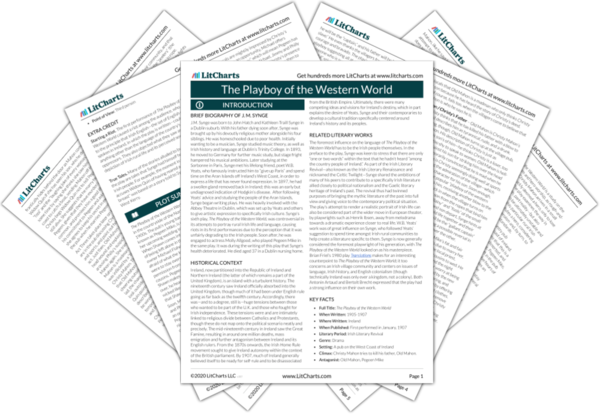A loy is a type of narrow spade traditionally used in Ireland for cultivating potatoes, an important crop on the island. As such, it represents Irish rural life and in particular the type of repetitive manual labor involved for inhabitants of the Irish countryside at the time of the play’s setting. It is with a loy that Christy Mahon thinks that he kills his father, Old Mahon, by striking him over the head. The loy, then, is a stand-in for Christy’s frustration at the drudgery and oppression of his former life, going from field to field with his tyrannical father. The humble farming implement thus transforms from a symbol of the mundane to a symbol of escape. The characters at the pub who hear Christy’s story—Peggy Mike, Michael Flaherty, and others—are impressed not just by Christy’s deed but the particular way in which he did it. They perceive a kind of bravery in Christy’s willingness to take his destiny into his own hands, which is linked to his use of the loy as opposed to a gun or a knife—more conventional weapons. When Mahon returns—not dead, just wounded—to find Christy, his son again strikes him with a loy, trying to inflict the fatal blow that he had failed to deal earlier. In this sense, then, the loy also shows Christy’s persistence in wanting to forge a new life for himself, the repetition of the method in the attempted killing echoing the repetitiveness of the loy’s usual agricultural function.
The Loy Quotes in The Playboy of the Western World
CHRISTY (impressively). With that the sun came out between the cloud and the hill, and it shining green in my face. “God have mercy on your soul,” says he, lifting a scythe; “or on your own,” says I, raising the loy.
SUSAN. That’s a grand story.
HONOR. He tells it lovely.
CHRISTY (flattered and confident, waving bone). He gave a drive with the scythe, and I gave a lep to the east. Then I turned around with my back to the north, and I hit a blow on the ridge of his skull, laid him stretched out, and he split to the knob of his gullet.
[He raises the chicken bone to his Adam’s apple.]
GIRLS (together). Well, you’re a marvel! Oh, God bless you! You’re the lad surely!
CHRISTY (in low and intense voice). Shut your yelling, for if you’re after making a mighty man of me this day by the power of a lie, you’re setting me now to think if it’s a poor thing to be lonesome, it’s worse maybe to go mixing with the fools of earth.
[Mahon makes a movement towards him.]
CHRISTY (almost shouting). Keep off…lest I do show a blow unto the lot of you would set the guardian angels winking in the clouds above.
[He swings round with a sudden rapid movement and picks up a loy.]
CROWD (half frightened, half amused). He’s going mad! Mind yourselves! Run from the idiot!
CHRISTY. If I am an idiot, I’m after hearing my voice this day saying words would raise the topknot on a poet in a merchant’s town.
PEGEEN. I’ll say, a strange man is a marvel, with his mighty talk; but what’s a squabble in your back-yard, and the blow of a loy, have taught me that there’s a great gap between a gallous story and a dirty deed. (To Men.) Take him on from this, or the lot of us will be likely put on trial for his deed to-day.
CHRISTY (with horror in his voice). And it’s yourself will send me off, to have a horny-fingered hangman hitching his bloody slip-knots at the butt of my ear.












